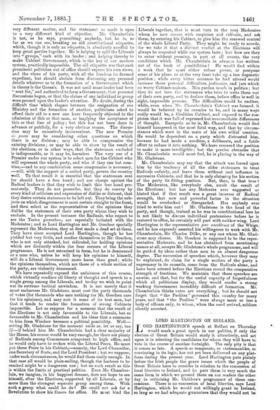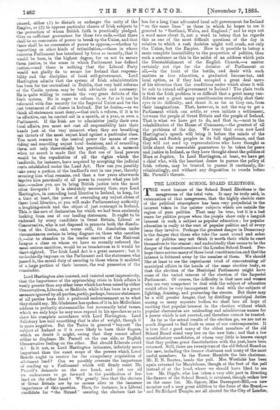LORD HART1NGTON ON IRELAND.
1140RD HARTINGTON'S speech at Belfast on Thursday would mark a great epoch in our politics, if only the electors of Great Britain would study it attentively, and act upon it in selecting the candidates for whom they will have to vote in the course of another fortnight. The only pity is that it comes so late. A speech so temperate, so statesmanlike, so convincing in its logic, has not yet been delivered on any plat- form during the present year. Lord Harlington puts plainly before the Irish people the grave issues which the people of Great Britain have to consider in relation to the concession of local liberties to Ireland, and he puts them in very much the same form in which we pressed them on our readers the other day in criticising Mr. Childers's programme of these con- cessions. There is no concession of local liberties, says Lord Hartington, which he would not willingly grant to Ireland, so long as we had adequate guarantees that they would not be abused, either (1) to disturb or endanger the unity of the Empire, or (2) to oppress particular classes of Irish subjects to the protection of whom British faith is practically pledged. Give us sufficient guarantees for these two ends,—that there shall be no concession of power to break up the Union, and that there shall be no concession of power to oppress,—whether by boycotting or other kinds of intimidation,—those in whose concerns Parliament has interfered by force so recently, that it would be base, in the highest degree, for us not to secure them justice, in the sense in which Parliament has defined justice,—and there is nothing that the Liberal Party would not gladly do to secure for Ireland that responsi- bility and the discipline of local self-government. Lord Harlington admits that the system of Irish administration has been far too centralised in Dublin, that very bold reforms of the Castle, system may be both advisable and necessary. Ha is quite willing to concede the very great. defects. of the Irish system, He is eager to reform it, so far as it can be reformed with due security for the Imperial Union and for the just, treatment of all classes in Ireland. But he denies„—as we think all statesmen must deny,—that such a reform, if it is to be effective, can be carried out in a month, or a year, or even a Parliament. If the Irish are to administer justly. their own local affairs, yen must not cast all responsibility into their heads just at the very moment when. they are breathing Oat threats of the most unjust kind against a particular class. You must reserve to the central power the means of over and cancelling unjust local decisions, and of cancelling. them, not only. theoretically but practically, at a moment when no secret is made that the first use of local powers, would- be- the, repudiation of all the rights which the landlords, for, instance, have acquired by accepting the judicial rents established under the Land Act. How can you possibly take away a portion of the. landlord's rent in one year, thereby, securing him what remains, and then a few years afterwards. deprive him, practically of all power to recover what, yen left hinr,---unleas you are to bring British. justice into the moat utter disrepute? It its absolutely necessary then, says Lord. Uartington, in conceding local liberties to Ireland, to keep, for. a, time at least,.the power of overruling any unjust .abuse of these local liberties, or you will make Parliamentary. authority altiughingetoc,k and the object of just contempt in Ireland. This is the sort. of declaration for which we had been.anviously looking. from one of our leading statesmen. It ought. to be endorsed. by every. candidate in Great Britain, Liberal or Conservative, who is not disposed to promote both the clissolu.- flan of the Union, and, worse still, its dissolution under eireurnstances certain., to, bring disgrace on those who sanction it,-..for to, abandon to, the tender mercies of. the National League a class on. whom we have so. recently enforced the most serious sacrifices, would be, as treacherous as it would be short-sighted.. The Irish Land Act is a great. measure ; but. it und.ouhtedly.imposes on the Parliament and the statesmen. who paseed.it, they moral, duty of securing. to those whom it mulcted of a,large portion of. their income,,tbe real possession, of the remainder..
Lord Harlington also insisted, and insisted most impressively, that the importance of the approaching crisis- in Irish affairs is vastly greater than any other issue which has been raised by either Conservatives, Liberals, or Radicals, while Hires been in a great measure ignored. by. all parties, partly, perhaps, because statesmen of all parties have felt a profound embarrassment as to what they should say. Mr. Gladstone has spoken of it in his Midlothian address in perfectly statesmanlike but necessarily brief terms, which we only hope he may soon expand in his speeches so as to show his complete accordance, with Lord Harlington. Lord Salisbury has said something that is also of weight, though it is. more negative. But the Tories in general " boycott the subject of Ireland as if it were likely to burn their fingers, which no doubt it might, seeing that they cannot afford' either- to displease M. Parnell on the one side, or English Conservative 'feeling on the other. But should Liberals avoid it ? Is it not, as Lord Harlington intimates, infinitely more important than the exact scope of the powers which Local Boards. ought. to receive for the compulsory' acquisition of allotment, land I. Can we possibly overrate the importance of sending up a Parliament which will firmly resist, Mr. Parnell's demands on the one hand, and yet use all its endeavours to go forward in the pacification of Ire- land on the other hand.? We greatly fear that the electors of-. Great Britain are by no means alive to the immense importance of thisquestion. Here, for instance, is a Liberal candidate for "the Strand " assuring the electors that he has for a long time advocated local self-government for Ireland " on the same lines " as those in which he hopes to see it granted to " Scotland, Wales, and England ;" and he says not a word more about it, not a word to betray that he regards this as one of the most difficult questions of the day in relation to which a rash decision might well crush, not only the Union, but the Empire. How is it possible to betray a more complete insensibility to the proportion of politics, than such a sentence as this in the midst of an address which puts the Disestablishment of the English Church,—a matter certainly not ripe for the decision of Parliament at all,--in the front of the battle, and deals with such matters as free education, a graduated Income-tax, and local option, as if they had occupied a great deal more of his attention than the conditions under which alone it will be safe to extend self-government to Ireland ? The plain truth is that the Irish problem is so difficult that a great many, can- didates and a. great many constituencies resolutely shut their eyes to its difficulty, and shunt it, so far as they can, from their imaginations. That, however, is not the way to get a Parliament which can settle, or even initiate a settlement„ between the people of Great Britain and the people of Ireland. That is what we have got to do, and that ia—next to the rehabilitation of the House of Commons,—the greatest of all the problems of the day, We trust that even now Lord Hartingtoils speech will bring it before the minds of the English. and Scotch peoples in its full significance, and that. they will not send up representatives who have thought an little about the reasonable guarantees to he taken for peace and justice in Ireland, as they, have thought about the pcditicaof Mara or Jupiter. In Lord Hartington, at least, we have got a chief who, with the heartiest desire to pursue the policy of Irish reform,, may be trusted to pursue it cautiously, die- crinainatingly, and, without any disposition to recede before. Mn Parnell's threats.















































 Previous page
Previous page